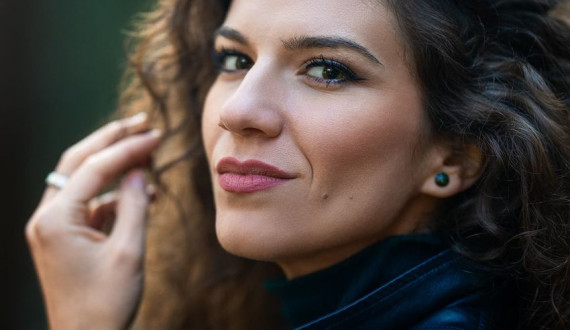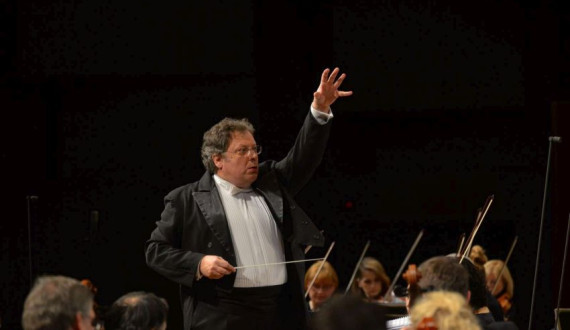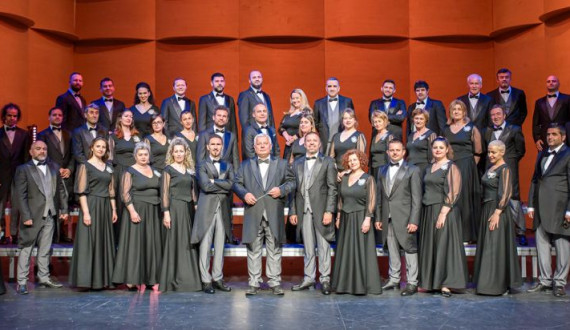MONTENEGRO AND EUROPE: THE MUSIC OF UNITY
2022-07-01 22:00
Square of the St. Tryphon Cathedral
Friday, July 1
Square of the St. Tryphon Cathedral, 9.30 p.m.
MONTENEGRO AND EUROPE: THE MUSIC OF UNITY
OLIVERA TIČEVIĆ, soprano (Montenegro)
ERMIN AŠĆERIĆ, tenor (Bosnia and Herzegovina)
MLADEN TARBUK, conductor (Croatia)
SYMPHONY ORCHESTRA OF THE NATIONAL THEATER OF OPERA AND BALLET OF ALBANIA (Albania)
Program:
Armand Limnander Nieuwengove (1814–1892)
Opera Les Montenegrins
Ouverture
Séducteurs charmants, Regina’s aria
Laisse-moi! Laisse-moi!, duet of Béatrix and Sergy
Georges Bizet (1838–1875)
Opera Carmen
Prelude to Act III
La fleur que tu m'avais jetée, Don José’s aria
Prelude to Act IV
Bedřich Smetana (1824–1884)
Symphonic poem Vltava, from the cycle From My Fatherland
Karel Bendl (1838–1897)
Opera Černohorci
Ouverture
Noc rozpjala již křídlo temné, Zajma’s aria [The Night Spread its Dark Wing]
Černá horo, moje domovino, duet of Zajma and Miloš [Montenegro, My Fatherland]
Antonín Dvořák (1841–1904)
Opera Rusalka
Song to the Moon, Rusalka’s aria
Partners of the concert:
Les Montènègrins, a three-act opera by the French-Belgian composer Armand Limnander, premiered on March 31, 1849 at the Paris Opéra-Comique. It is based on the libretto by Alboize de Pujol and Gérard de Nerval. Although he did not stay in Montenegro, Nerval, inspired by the stories of Montenegrin heroism and scenes from everyday life, prepared a libretto that gave Limnander the opportunity to introduce elements of folklore and gusle thanks to a realistic plot. The opera takes place on the border of the Bay of Kotor and Old Montenegro, in 1807, during the arrival of the French army in Boka. The main character of the opera, a gusle player Ziska, his adopted daughter Beatrix, a Montenegrin leader Andreas, and a Montenegrin girl Regina are plotting to get rid of the captain of the French army, Sergy. Montenegrins are participating in the conspiracy, convinced that by sacrificing Sergy, they will prevent the French from setting out to conquer the hills above Kotor. The dramaturgical course of the opera is imbued with a love plot, a fatal meeting between Beatrix and Sergy, and a somewhat comical seductive rivalry between the girl Regina and Foliquet, a soldier in the service of Captain Sergy. The opera ends with a happy ending – the Montenegrins carry palm branches towards the French, and the flags of France and Montenegro unite and fly while everyone sings “Monténégro, Dieu te protège, et tu seras libre à jamais comme la neige de tes sommets.” After its premiere, the opera was performed several times, becoming part of the standard repertoire in 1858, after being revised into two acts.
FROM THE LIBRETTO:
(Translator: Jovana Todorović)
(Translator: Jovana Todorović)
Regina’s aria
First couplet.
First couplet.
Delightful philanderers,
Perfidious lovers,
Splendid birds of passage,
All the whispering,
All the flattery,
We already know your visage.
Just a tiny kiss.
Just one,
On the rosy brow,
Just a tiny kiss.
Just one,
What’s not to allow,
You can’t turn it down.
Second couplet.
The words so sweet,
Dipped in honey and neat,
Of those, ladies, beware,
They are the birds
The birds of prey
Don’t long for plumage with flair.
Just a tiny kiss.
Just one,
On the rosy temple
Just a tiny kiss.
Just one,
What’s not to allow,
You can’t turn it down!
A kiss, and we’re not even married yet.
Duet of Béatrix and Sergis
Sergis:
Leave me alone, this is betrayal.
You’re no longer my heart’s desire;
Your voice mellow, disingenuous love fire,
You surrendered me to the rival.
Béatrix:
Oh, my God! What are you saying, what have I done now?
Sergis:
Delightful and deceitful,
With an air dutiful,
Her charming mien.
Look full of innocence,
With a loving glance,
That is her scheme.
Béatrix:
The one who loves you, you now accuse!
It’s a crime and slander, there’s no excuse!
Who rescued you from the deadly peril?
I had to deceive you and save you fast.
I tricked you, because they would have, at last
Killed you in front of me, but I saved you.
I have also done this; come, the watchmen are charmed,
Your escape, we’ve planned it all.
Let’s hurry before they come.
Sergis:
If what you say is true, to you I’m indebted;
But if I were you, myself I wouldn’t have protected.
There’s no excuse for this mission! My life is over,
Do you know what honor means to a soldier?
I have to face my comrades, but how?
How will I put up with their fury now,
And their disdain, how will I endure it?
What! I betrayed the trust
Of France
It’s my homeland I’m losing!
Together:
I have to face my/your comrades, but how?
How will I resist the fury now?
And their disdain, how will I endure it? Etc.
Béatrix:
Do you understand what a woman’s love is?
You’ll learn it all… The dishonorable accusations don’t
hurt.
I’ll take the fall for the shame and disdain.
You’ll learn it all; I’ll take the fall for disdain.
Sergis:
No, no, I don’t want honor, if that’s the price.
Oh! What will your brothers say?
Béatrix:
My brothers? Why would I care?
Sergis:
To face their fury I do not dare!
Béatrix:
I’m challenging their fury.
To save your honor
To my country I turned traitor.
Together:
The same fires from the past
In our souls still last
What notorious pact
Takes it away.
The hearts put in motion
On the same wheel of fortune
There’s no misfortune
That will lead them astray.
(The orchestra keeps playing quietly)
Sergis to Béatrix:
Now tell me… Tell me… The telegram, you’ve seen it…
What does it say?
Béatrix, trying to remember:
“In the armory of the Maladeta castle is the flag
Montenegrins respect most… Raise the flag on the
tower of the Holy Trinity at dawn.”
Sergis, sharply:
The flag… Yes… I saw it last night… Let’s hurry!
Perfidious lovers,
Splendid birds of passage,
All the whispering,
All the flattery,
We already know your visage.
Just a tiny kiss.
Just one,
On the rosy brow,
Just a tiny kiss.
Just one,
What’s not to allow,
You can’t turn it down.
Second couplet.
The words so sweet,
Dipped in honey and neat,
Of those, ladies, beware,
They are the birds
The birds of prey
Don’t long for plumage with flair.
Just a tiny kiss.
Just one,
On the rosy temple
Just a tiny kiss.
Just one,
What’s not to allow,
You can’t turn it down!
A kiss, and we’re not even married yet.
Duet of Béatrix and Sergis
Sergis:
Leave me alone, this is betrayal.
You’re no longer my heart’s desire;
Your voice mellow, disingenuous love fire,
You surrendered me to the rival.
Béatrix:
Oh, my God! What are you saying, what have I done now?
Sergis:
Delightful and deceitful,
With an air dutiful,
Her charming mien.
Look full of innocence,
With a loving glance,
That is her scheme.
Béatrix:
The one who loves you, you now accuse!
It’s a crime and slander, there’s no excuse!
Who rescued you from the deadly peril?
I had to deceive you and save you fast.
I tricked you, because they would have, at last
Killed you in front of me, but I saved you.
I have also done this; come, the watchmen are charmed,
Your escape, we’ve planned it all.
Let’s hurry before they come.
Sergis:
If what you say is true, to you I’m indebted;
But if I were you, myself I wouldn’t have protected.
There’s no excuse for this mission! My life is over,
Do you know what honor means to a soldier?
I have to face my comrades, but how?
How will I put up with their fury now,
And their disdain, how will I endure it?
What! I betrayed the trust
Of France
It’s my homeland I’m losing!
Together:
I have to face my/your comrades, but how?
How will I resist the fury now?
And their disdain, how will I endure it? Etc.
Béatrix:
Do you understand what a woman’s love is?
You’ll learn it all… The dishonorable accusations don’t
hurt.
I’ll take the fall for the shame and disdain.
You’ll learn it all; I’ll take the fall for disdain.
Sergis:
No, no, I don’t want honor, if that’s the price.
Oh! What will your brothers say?
Béatrix:
My brothers? Why would I care?
Sergis:
To face their fury I do not dare!
Béatrix:
I’m challenging their fury.
To save your honor
To my country I turned traitor.
Together:
The same fires from the past
In our souls still last
What notorious pact
Takes it away.
The hearts put in motion
On the same wheel of fortune
There’s no misfortune
That will lead them astray.
(The orchestra keeps playing quietly)
Sergis to Béatrix:
Now tell me… Tell me… The telegram, you’ve seen it…
What does it say?
Béatrix, trying to remember:
“In the armory of the Maladeta castle is the flag
Montenegrins respect most… Raise the flag on the
tower of the Holy Trinity at dawn.”
Sergis, sharply:
The flag… Yes… I saw it last night… Let’s hurry!
The romantic opera in three acts Černohorci, written by the Czech composer Karel Bendl in 1877, premiered on September 11, 1881 at the New Theater in Prague. The libretto was written by Jozef Otakar Veselý (1853–1879), who is believed to have been born in Herceg Novi and was for a fact the librettist of Bendl and Dvořák. Bandl’s interest in the Slavic people in the south was aroused by the composer’s friendship with the painter Jaroslav Čermák (1830-1878), who visited Montenegro on several occasions and painted some of his most successful artworks there. Čermák prepared costumes and scenography for the premiere of Bandel’s opera in Prague, after which it became considered a significant contribution to the Czech national opera repertoire. Bendl built the opera on the motifs of Montenegrin folk songs, most probably using the tunes collected and edited in Montenegro by Franjo Kuhač (1834–1911). Historic circumstances and figures of Montenegro of that time are used and combined freely by Veseli, creating a unique and original narrative. The opera takes place in a rocky landscape on the border of Montenegro and Turkey, where Montenegrin leaders Nikola Knežević and Miloš Martinović are plotting with Montenegrins to ransom Prince Njegoš who, when invited to Podgorica for negotiations, was tricked and caught by the Turks. At the center of the plot is a melodrama between Miloš and Zajma, the daughter of Hussein Paşa. A covert poturica (non-ethnic Turk), Ljubota, makes a deal with Hussein Paşa to get a high position for himself in favor, and is thinking of how to capture Miloš, whom Zajma is in love with, in order to reunite them. In the plot, the kidnapping of Nikola’s mother takes place, and although Miloš releases her, he himself ends up being captured due to Ljubota’s betrayal. The end of the opera marks the ransoming of the prince, a conflict between Turks and Montenegrins in which Miloš is wounded, and a devotion of his wife Milica. The opera is the brought to a triumphant close with people celebrating and singing “Tam, tamhle... za těmi vrchy...” [There, there...behind those hills]. After the premiere, the opera Černohorci was on the repertoire of the theater season in 1881 and 1883, and its first performance on the stage of the National Theater in Prague was in 1886. Both operas have not been previously performed in Montenegro.
FROM THE LIBRETTO:
(Translator: Jovana Todorović)
(Translator: Jovana Todorović)
Duet of Zajma and Miloš
Miloš:
Montenegro, my motherland,
You're so dreamy and so gorgeous,
Oh, dearly beloved mother,
You bear wine and figs and olives.
Montenegro, Montenegro, my motherland,
Montenegro, I'm your valiant descendant.
Zajma:
He is such a handsome fellow,
And what lovely song, so mellow;
Body slender and athletic,
His lips moving, so attractive,
It's all making me feel silly.
With wild love my heart is burning,
You shining sun, for you I’m yearning,
My death will be the endless longing,
Hero, you song was truly beautiful.
Miloš:
My song belongs to my motherland;
And since my childhood they always taught me,
That above all else you love your country.
Zajma:
It is noble to serve your country,
To be its faithful devoted son,
But to pine for a girl who is lovely,
To dream day and night of her love,
And with your whole heart to love her,
That also fits a courageous fighter.
Miloš:
The joys and aches of love I know,
As there is a girl I love.
Zajma:
The joys and aches of love he knows,
As there is a girl he loves.
Miloš:
And during the battles with our foes,
She's the one who charges my arms.
Zajma:
My blood boiled from what I heard
To my head like a fury it rushed.
Miloš:
She is as quiet as a summer's night,
And as beautiful as a wild rose.
If one day I do heroically perish,
I wish to die in her lap,
In her lap, that is my wish,
In her lap I want to perish.
Zajma:
My heart is wounded, burned,
How can I avenge it, my beloved?
Miloš:
Well, look at that, it is my darling:
And up to her I will start walking,
I want to plant kiss upon kiss
On her kind face that gives me bliss.
Zajma:
A wild fire is burning in my heart,
The kind of fire that is unsettling.
The love in which my heart is caught,
Will bear wonders worth remembering.
Zajma's aria
The wings of darkness the night has spread,
A gentle breeze is blowing tonight,
The moon is up there, looking all sad,
My love is nowhere in sight.
Many a charm the night conceals,
When its breath touches my being,
Like waiting for love my whole world feels,
To the night my heart is praying.
One desire my heart consoles,
That you will bring me the one I adore.
Montenegro, my motherland,
You're so dreamy and so gorgeous,
Oh, dearly beloved mother,
You bear wine and figs and olives.
Montenegro, Montenegro, my motherland,
Montenegro, I'm your valiant descendant.
Zajma:
He is such a handsome fellow,
And what lovely song, so mellow;
Body slender and athletic,
His lips moving, so attractive,
It's all making me feel silly.
With wild love my heart is burning,
You shining sun, for you I’m yearning,
My death will be the endless longing,
Hero, you song was truly beautiful.
Miloš:
My song belongs to my motherland;
And since my childhood they always taught me,
That above all else you love your country.
Zajma:
It is noble to serve your country,
To be its faithful devoted son,
But to pine for a girl who is lovely,
To dream day and night of her love,
And with your whole heart to love her,
That also fits a courageous fighter.
Miloš:
The joys and aches of love I know,
As there is a girl I love.
Zajma:
The joys and aches of love he knows,
As there is a girl he loves.
Miloš:
And during the battles with our foes,
She's the one who charges my arms.
Zajma:
My blood boiled from what I heard
To my head like a fury it rushed.
Miloš:
She is as quiet as a summer's night,
And as beautiful as a wild rose.
If one day I do heroically perish,
I wish to die in her lap,
In her lap, that is my wish,
In her lap I want to perish.
Zajma:
My heart is wounded, burned,
How can I avenge it, my beloved?
Miloš:
Well, look at that, it is my darling:
And up to her I will start walking,
I want to plant kiss upon kiss
On her kind face that gives me bliss.
Zajma:
A wild fire is burning in my heart,
The kind of fire that is unsettling.
The love in which my heart is caught,
Will bear wonders worth remembering.
Zajma's aria
The wings of darkness the night has spread,
A gentle breeze is blowing tonight,
The moon is up there, looking all sad,
My love is nowhere in sight.
Many a charm the night conceals,
When its breath touches my being,
Like waiting for love my whole world feels,
To the night my heart is praying.
One desire my heart consoles,
That you will bring me the one I adore.

Olivera Tičević, soprano, after completing bachelor’s studies at the Faculty of Music in Belgrade under Professor Aneta Ilić, as a scholarship holder of the City of Bern and winner of the national scholarship for excellence of the Ministry of Education of Montenegro, completed master's studies at the Bern University of Arts, under Professor Christian Hilz, with the highest academic marks and as the best student of the University. She has won numerous awards and recognitions. Olivera Tičević had her first regional OLIVERA opera debut as Pamina in Mozart’s Magic Flute at the Madlenianum Opera in Zemun. She has appeared in the roles of Despina (Mozart, Così fan tutte), Lucy (Weil, The Threepenny Opera), and Musetta (Puccini, La bohème). She made her wider international premiere with the Zurich Opera as Pamina in Mozart’s Magic Flute. She has performed at the Bern Theater, the Oslo Opera Festival, and at many other significant venues. As an artist who interprets contemporary music, she has performed the very demanding piece Le Grand Macabre by György Ligeti and has premiered music by Žarko Mirković, Nina Perović, Marko Kovač, and Draško Adžić. Olivera Tičević has been engaged in several opera and vocal-instrumental projects in Montenegro, Bern, Vienna, Stockholm, and Oslo.

Ermin Ašćerić, tenor, after completing the Zenica Secondary Music School, enrolled at the Academy of Arts in Novi Sad, where he is currently studying under Professor Ljiljana Lišković. He is a first-prize winner of several competitions, such as the Cantonal Competition in Zenica, the Čitluk Federal Competition, the Vera Kovač Vitkai International Competition in Novi Sad, the Primavera International Competition, the Nikola Cvejić International Competition of Vocal Artists in Ruma, the Lazar Jovanović International Competition, the Slavic Music Festival, and the Canto Bene International Youth Competition for Singers. Ermin Ašćerić has attended master classes by Klaudija Krkotić, Mihalj Kalmandi, and Vera Kovač Vitkai. He was awarded a scholarship from the Melanija Bugarinović and Daughter Mirjana Kalinović-Kalin Fund for the Advancement of Youth Vocal Art. He has collaborated with the MOTO Music-Opera-Theater Organization from Belgrade, with which he had his debut in the first Serbian opera At Dawn in the role of Rade. As a member of the Visoko C Association from Novi Sad, Ermin Ašćerić has participated in the plays Baš Čelik and Cinderella. He has been professionally engaged in the National Theater in Belgrade, where he debuted as Alfred in Die Fledermaus.

Mladen Tarbuk, a prominent Croatian composer and conductor, completed his studies in Composition and Conducting in Graz, Zagreb, and Vienna. He has appeared in almost all European countries, Canada, the United States, and Mexico, often performing his own works. He has regularly collaborated with the German Oper am Rhein (Düsseldorf), the Wiener Concert-Verein, the Orquesta Sinfónica Nacional de México, and the Hungarian State Opera. Mladen Tarbuk is a holder of numerous Croatian and international awards and recognitions – Slavenski, Papandopulo, HAZU, Janáček, E. Vogel, Risuonanze Trieste, and Tolosa. He served as the Director of the Croatian National Theater in Zagreb (2002–2005) and then as its Music Director (2013–2017). Mladen Tarbuk was appointed Director of the Dubrovnik Summer Festival and, since 2020, he has been the chairman of the Croatian Society of Composers. In all these executive positions, Mladen Tarbuk has striven to strengthen the artistic program, to open institutions to the world, and create bridges of cooperation with similar neighboring institutions. He has also made key contributions to realizing the agreements on cooperation between KotorArt and the surrounding festivals. In the 2021/2022 season, Mladen Tarbuk conducted the Montenegrin Symphony Orchestra. He is a Full Professor of Composition, Conducting, Music Theory, and Orchestra at the Academy of Music in Zagreb.

Originally founded in 1950, the Symphony Orchestra of the National Theater of Opera and Ballet of Albania became an integral part of the Albanian National Opera and Ballet in 1953. It has played an important role in all the stage activities of the Theater, from its beginnings until today. Since 1990, the Orchestra has had the honor of touring in Italy, France, Turkey, Greece, Northern Macedonia, Kosovo, Croatia, Bosnia and Herzegovina, Switzerland, and Belgium. In recent years, the Orchestra has gathered musicians educated at the prestigious universities of music in Prague, Leipzig, Sofia, and, of course, Tirana. The Orchestra has been conducted by renowned artists, starting with maestro Mustafa Krantja, and including Rifat Teqja, Simon Gjoni, Ermir Krantja, Fiqiri Kraja, Bujar Llapaj, and Edmond Doko. Their repertoire includes productions of opera and ballet performances and hundreds of works of symphonic, vocal-instrumental, instrumental, and program music, by both Albanian and foreign composers. The Orchestra’s interpretations are highly acclaimed for their pure and refined sound and lavish sound colors. The Orchestra has made numerous recordings for Albanian Television. They have performed numerous works by Albanian authors, such as Zadeja, Zoraqi, Daija, Ibrahimi, Dizdari, and Peçi, among others, as well as symphonic works of the world’s greatest composers.

